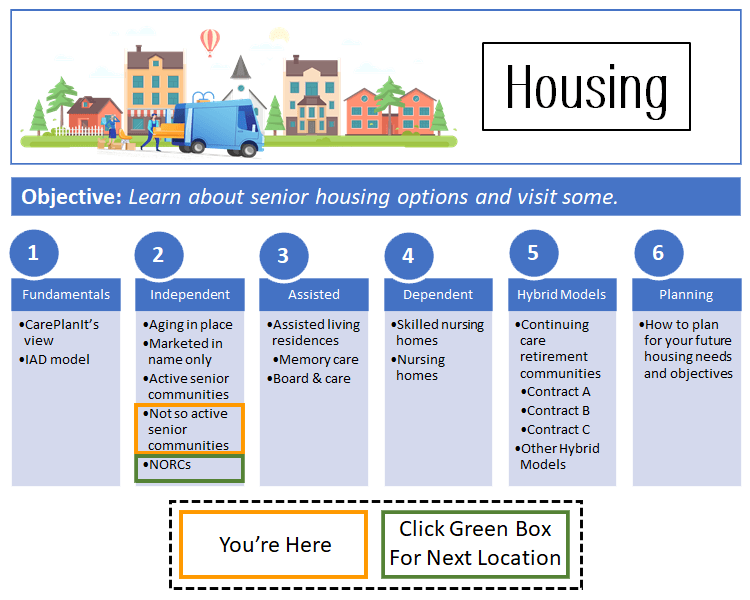Senior Apartments
Click here to see what's on this page.
Visit Apartments.com on the internet or another apartment finding application, type in “senior apartments,” and you’ll find hundreds, sometimes thousands of apartments meeting this criterion. What does this mean?

Let’s start with what an owner or manager of senior apartments can actually do for seniors. Can the owner rent to anyone they want? Can they just rent to black people or white people? How about just Protestants or Catholics? Can they refuse to rent to families?
The answer to the questions above is no. No, no, and no. Senior apartment managers can apply credit scores, income to rent ratios, and employment histories as long as the criteria are applied consistently to all applicants. But they cannot discriminate just because they want to discriminate.
The Fair Housing Act Prevents Housing Discrimination
Apartment complex owners can’t discriminate because The Federal Fair Housing Act (“FHA”) does not allow discrimination based on race, color, religion, sex, national origin, disability, and family status (age, presence of children, pregnancy, etc.). If you want more details, see our section on the FHA here.
Exceptions To The FHA
There is one significant carve-out to the Federal Fair Housing Act, and that’s for age. Within this exception, there are two main ways to qualify. The first and most common way to qualify is to ensure 80% of the apartment units are occupied by at least one person 55 or older and that the community adheres to a policy that demonstrates an intent to house persons 55 or older. The second is for the senior housing managers to rent, lease or sell only to residents 62 and older.
In both cases, community managers must show demonstrable intent to focus on seniors through policies and procedures. The 62 and older exception is self-evident. The 55 and older exception requires some effort to demonstrate intent. For example, the apartment managers might provide activities for seniors, transportation to medical appointments, onsite medical services, and 24-hour security.
However, the senior apartment community managers can offer much less. They may offer as little as a few amenities like an activity room and common media room, and say they have senior activities or senior movie nights. In other words, you don’t need to offer a lot to prove intent.
Penalties For Failing To Meet The FHA Exception
The Housing for Older Persons Act (HOPA) of 1995 took many teeth out of violations of FHA provisions. Essentially, as long as the builder or landlord acts in good faith, there are few penalties for inappropriately advertising or marketing a senior living facility. Facilities falling short of the requirements are likely to be given time to get back in compliance.
The biggest risk is from residents that might hire a Plaintiff’s Attorney to sue for contractual damages and any damage that might have occurred for the senior facility being out of compliance. For example, damages might occur if younger residents are let in and are responsible for crimes or damages.
The issues above are why it’s important to thoroughly investigate any facility you’re thinking of making your new home. Ask if they are a legally qualifying senior community. Request their bylaws, and resident requirements. If they’ve given you any marketing literature, ask them if they’re required to marinating the amenities and services described. If they say yes, ask where that commitment is in writing.
Common Senior Apartment Amenities And Services
The age restriction is the most common amenity for senior apartments for independent living (those not offering assisted services). Let’s say that again. The age restriction is the one amenity you can count on in legally qualified senior apartments. Luckily, both renters and apartment managers see value in age restrictions.
Apartments that really want to attract seniors focus on what seniors want or need. In other words, they offer amenities targeted at seniors. These amenities fall into areas like transportation, health, opportunities to socialize, and ways to save money. Carmen and I list a few that fall into these categories below.
Senior Apartments In Name Only
However, some senior apartments that don’t meet the legal requirements to discriminate based on age have to rent or sell to everyone. This means your “senior” community can become a children’s community, family community, or “anything but” a senior community.
In other words, some apartment are marketed with words like “senior,” “adult,” “quiet,” and
All this said, non-qualifying senior communities can still be good for seniors. For example, the facility can offer seniors amenities and services, like these:
However, keep in mind that you may be competing for these services with families, children, and younger residents.
